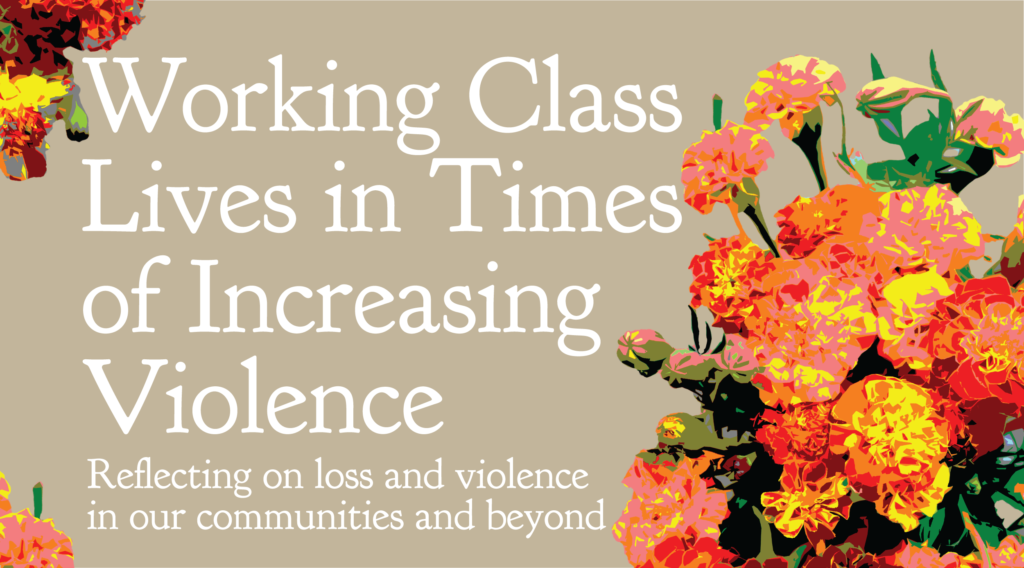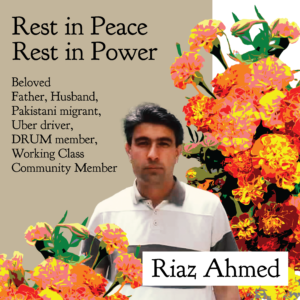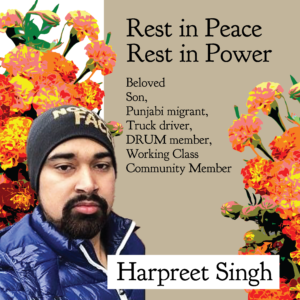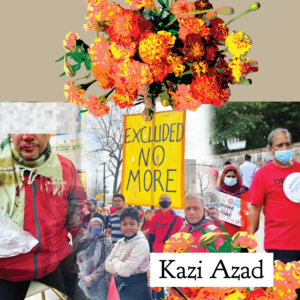We are upset, heartbroken, and grieving.
We at DRUM are sad to report the recent loss of our members, Riaz and Harpreet. They were both shot and killed—Riaz was killed while working as an Uber driver in Canada, and Harpreet was shot after going out to buy groceries in Indiana. We share our deep condolences for their immediate family, friends, and our communities who loved them.
In the recent period, we are seeing an increase in violence across the city, across the country, and even beyond. A few weeks ago another one of our members, Kazi Azad, was punched in the face after an argument with another customer at a restaurant, left bleeding with a broken nose, and then accosted and harassed by the NYPD.
In the past few weeks, we learned of Zinat Hossain, a 24-year-old Bangladeshi woman and college student from Brooklyn, who died by apparent suicide according to the NYPD and the family. Initial social media based on unfounded rumors that suggested she was pushed in front of a train were later stated to be untrue.
Violence and harm are increasing - across our communities (Riaz and Harpreet), within our communities (Kazi Azad), and even within ourselves (Zinat). More than two years of the pandemic, economic instability, mental health crisis with little available support, and increased stress from health and economic concerns, are all taking a toll on people individually and collectively. These stories are just a few of the painful and unacceptable ways our working class communities are hard hit by oppression
It’s up to us to take care of one another and to loudly mourn those we have lost to a cruel and unjust system, and to struggle towards safety, connection and community.
And rather than having a society where the needs of people are taken care of and put first, we are living under a cruel capitalist system. This sort of violence is an essential part of the systems we struggle against, as we can see from the mass shootings in Buffalo, New York, Laguna Woods, CA and in Uvalde, Texas. Not only does the US have the highest per capita gun ownership on the planet, it also has the highest inequality in the Global North, refusal to provide basic systems of health and care, extreme racism against Black and brown communities, glorification of male violence, and a government that is, in the words of Martin Luther King Jr., “the greatest purveyor of violence” in the world. These manifestations of violence are not aberrations, but rather they are deeply rooted in our culture and society.
Workers are placed in precarious circumstances that risk their lives. Without a system that aims to provide people the support they need, we turn our anger and frustrations against each other, our loved ones, and against ourselves. Bearing the heaviest brunt of it, working class women, children, LGBTQ+ folks, and men whose lives are rendered disposable.
People are hurting, both in our immediate communities and beyond. We cannot rely on the system of racial capitalism to keep us safe or cherish our lives as workers. In the wake of such news, we must hold each other close however we can. While it is easy to lose hope, we must resist despair. Our actions have always been fueled by the hope for a better world where we are cared for and care for others.
It’s up to us to take care of one another, to loudly mourn those we have lost to a cruel and unjust system, and to struggle towards safety, connection and community. Join an organization. Build communities of mutual support and cooperation. As working class communities of color and our allies, we must challenge ourselves to practice hope by leaning in and building human connections. Organize and fight now for a just future and to deeply transform this society.
Click on the tabs below to read more about Riaz, Harpreet, and Kazi.




